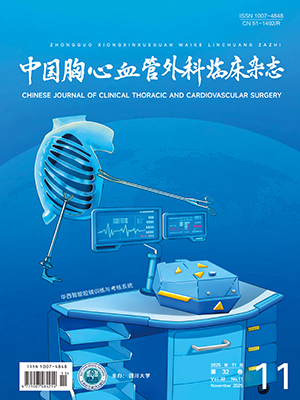Objective To investigate the impact of COVID-19 infection on the early clinical outcomes of patients undergoing valve replacement. Methods Perioperative data of patients who underwent single valve replacement at the Second Affiliated Hospital of Chinese People's Liberation Army Medical University from January to February 2023 were consecutively collected. Based on COVID-19 infection status, patients were divided into a COVID-19 group and a non-COVID-19 group. The perioperative data were compared between the two groups. Results A total of 136 patients were included, comprising 53 males and 83 females, with a mean age of (53.4±10.2) years. There were 32 patients receiving aortic valve replacements, 102 mitral valve replacements, and 2 tricuspid valve replacements. The COVID-19 group comprised 70 patients, and the non-COVID-19 group included 66 patients. No statistical difference was observed in the incidence of postoperative complications between the two groups [9.09% (6/66) vs. 11.43% (8/70), P=0.654]. However, the COVID-19 group had longer postoperative mechanical ventilation duration [1 201.00 (1 003.75, 1 347.75) min vs. 913.50 (465.50, 1 251.00) min, P=0.001] and ICU stay [3 (2, 3) days vs. 2 (2, 3) days, P<0.001] compared to the non-COVID-19 group. Additionally, troponin I [4.76 (2.55, 7.93) ng/mL vs. 2.66 (1.19, 5.65) ng/mL, P=0.001] and brain natriuretic peptide [608.50 (249.75, 1 150.00) pg/mL vs. 192.00 (100.93, 314.75) pg/mL, P<0.001] levels were significantly higher in the COVID-19 group. Conclusion For patients with single valve disease undergoing elective surgery, short-term outcomes after recovery from COVID-19 infection are favorable, with no significant increase in in-hospital mortality or postoperative complication rates.
Citation:
XU Liu, HUO Yongfeng, TIAN Lijun, ZHU Yun, XIAO Juan, MA Ruiyan. Influence of COVID-19 infection on the early clinical efficacy of patients undergoing single valve replacement surgery: A retrospective cohort study. Chinese Journal of Clinical Thoracic and Cardiovascular Surgery, 2025, 32(5): 634-638. doi: 10.7507/1007-4848.202308043
Copy
Copyright © the editorial department of Chinese Journal of Clinical Thoracic and Cardiovascular Surgery of West China Medical Publisher. All rights reserved
| 1. |
|
| 2. |
|
| 3. |
|
| 4. |
|
| 5. |
|
| 6. |
|
| 7. |
|
| 8. |
WHO Coronavirus (COVID-19) Dashboard. WHO Coronavirus (COVID-19) Dashboard with vaccination data.
|
| 9. |
|
| 10. |
Zhao YM, Shang YM, Song WB, et al. Follow-up study of the pulmonary function and related physiological characteristics of COVID-19 survivors three months after recovery. EClinicalMedicine, 2020, 25: 100463.
|
| 11. |
|
| 12. |
|
| 13. |
|
| 14. |
|
| 15. |
郭浩. 体外循环下心脏术后小剂量甘露醇缓慢应用临床疗效及安全性的研究. 新乡医学院, 2022.Guo H. Clinical efficacy and safety of slow application of low-dose mannitol after cardiac surgery under cardiopulmonary bypass. Xinxiang Medical University, 2022.
|
| 16. |
|
| 17. |
|
| 18. |
师艳菲, 李佩远, 黄达, 等. 血清LDH与CK-MB水平对不同类型COVID-19患者心肌损伤状况的Meta分析. 第十二届全国体育科学大会论文摘要汇编—墙报交流 (运动医学分会), 2022: 353-354.Shi YF, Li PY, Huang D, et al. Meta-analysis of serum LDH and CK-MB levels on myocardial injury in different types of COVID-19 patients. Abstracts of the 12th National Sports Science Congress: Poster Exchange (Sports Medicine Branch), 2022: 353-354.
|
| 19. |
|
- 1.
- 2.
- 3.
- 4.
- 5.
- 6.
- 7.
- 8. WHO Coronavirus (COVID-19) Dashboard. WHO Coronavirus (COVID-19) Dashboard with vaccination data.
- 9.
- 10. Zhao YM, Shang YM, Song WB, et al. Follow-up study of the pulmonary function and related physiological characteristics of COVID-19 survivors three months after recovery. EClinicalMedicine, 2020, 25: 100463.
- 11.
- 12.
- 13.
- 14.
- 15. 郭浩. 体外循环下心脏术后小剂量甘露醇缓慢应用临床疗效及安全性的研究. 新乡医学院, 2022.Guo H. Clinical efficacy and safety of slow application of low-dose mannitol after cardiac surgery under cardiopulmonary bypass. Xinxiang Medical University, 2022.
- 16.
- 17.
- 18. 师艳菲, 李佩远, 黄达, 等. 血清LDH与CK-MB水平对不同类型COVID-19患者心肌损伤状况的Meta分析. 第十二届全国体育科学大会论文摘要汇编—墙报交流 (运动医学分会), 2022: 353-354.Shi YF, Li PY, Huang D, et al. Meta-analysis of serum LDH and CK-MB levels on myocardial injury in different types of COVID-19 patients. Abstracts of the 12th National Sports Science Congress: Poster Exchange (Sports Medicine Branch), 2022: 353-354.
- 19.




